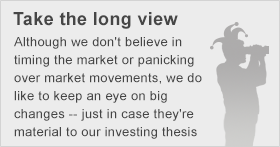
U.S. stocks ended lower on Tuesday, with the benchmark S&P 500 index and the narrower Dow Jones Industrial Average (^DJI 0.51%) down 0.5% and 0.4%. Perhaps ominously, a dense quantitative research note from Morgan Stanley published yesterday concluded that the performance of factors that best explain recent outperformance among growth stocks (those factors being long term growth rate forecasts, trailing sales growth, R&D spending, headcount growth) "has mimicked that seen in the Tech Bubble." Not surprisingly, on the other hand, "valuation factors have done poorly at selecting growth stocks." Meanwhile, prominent among the new cohort of growth names, Facebook (FB 0.69%) lagged the market today, ostensibly on a report that its headcount could fall by one; mind you, it's a very important head: that of chief operating officer Sheryl Sandberg.

Facebook had a great start to the week: On Monday, investment bank UBS raised their price target from $72 to $90 – the highest such target among any of the 49 analysts who follow the stock. Investors did not require a better excuse to push the shares up more than 3% to a new record high of $72.03. In explaining the action, UBS cited Facebook's improved pricing power:
Our first-quarter advertiser channel checks suggest that the pricing strength exhibited in Q4, up 92 per cent year on year, price per ad, has carried over into early 2014 and is likely sustainable for longer than our prior estimates had assumed.
Citigroup followed UBS today with a report raising its price target for Facebook's stock from $70 to $85; however, that was not enough for a repeat of yesterday's performance. In fact, Facebook's stock gave up more than 2.5%, erasing nearly all of Monday's gains.
One possible explanation for the decline (beyond the tried-and-trusted "profit-taking"): an article in the New York Post according to which Facebook COO Sheryl Sandberg could be candidate to replace Bob Iger as chief executive of The Walt Disney Company (DIS +0.55%) (admittedly, the report was published a half-hour after the market's close.) Iger is slated to remain Disney's chairman and CEO through July 2016; Sandberg currently sits on Disney's board. According to the Post, she "is said to have had conversations about her interest."
This is the opportunity to mention that Sheryl Sandberg's contribution to Facebook is almost certainly overstated in the public imagination (not to mention her image as a model businesswoman). Let me be clear: Sandberg is unusually intelligent and very likely highly competent, but a large part of the high-profile (and billion-dollar net worth) she has achieved is due to being in the right place at the right time when she joined Google in 2001. If Facebook were to lose Sandberg, it would certainly be a loss for the company, but I'm not convinced it would fundamentally impair its growth prospects.
But back to Facebook's shares. They're certainly an example of the phenomenon Morgan Stanley highlighted in their report -- the stock is the second-best performer in the S&P 500 over the past 12 months. Facebook is a better business than I had initially thought, but putting a value on the shares remains a perilously difficult exercise. Shareholders have to take a leap of faith that Facebook's growth and profitability will ultimately overwhelm valuation multiples that look stretched. Furthermore, in order to be vindicated, they will need to be able to tolerate substantial volatility along the way.







